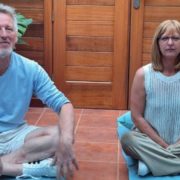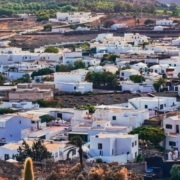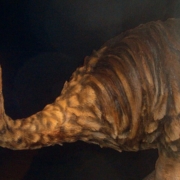Breathwork is a way to use controlled breathing technique to improve your mental and physical health. And Lanzarote is the perfect place to try it.
Lanzarote is constantly combed by north-easterly winds called alisios, part of an immense Atlantic weather system. This means the air on the island is constantly refreshed and replaced and is usually extremely clean and fresh.
This can change, though. While many hay fever sufferers discover that their symptoms disappear on the island, that doesn’t mean that pollen doesn’t exist here. Depending on the time of year, palm trees and other local plants can produce pollens which may cause their own allergies. Levels are almost always low, however.
There’s also the issue of calimas. These occur when the alisio system is temporarily replaced by easterly and southerly winds from the African mainland, which can bring huge amounts of airborne Saharan dust to the islands. Local air pollution, mainly caused by emissions from cars and other forms of transport, can also be high in built-up areas.
But the vast majority of islanders never suffer any problems with air quality, and Lanzarote’s fresh, clean sea air is one of the island’s great attractions. The question is: how can you maximise this precious gift?
Breathwork is both ancient and modern. Buddhist meditation practices and yoga have involved controlled breathing for millennia, but the term breathwork only appeared in the 1970s, with a variety of healing practices that are largely based on those ancient traditions.
It seems strange that we can learn how to improve something as fundamental as breathing, an action every single one of us has been carrying out for every minute of our lives. But, just as we can learn how to improve our posture and our sleep, raising consciousness of breathing can lead to some surprising revelations.
There’s little argument that breathwork can help with stress and mental health, but regular practitioners also claim that it can ease existing ailments and improve performance. Free divers who hold their breath for long periods usually use advanced breathing techniques, but it can also be effective for something as normal as an important work meeting.
But breathwork is not something that should be attempted alone. The internet is full of videos and podcasts that claim to teach you how to breathe better, but not all techniques are easy, and the guidance of a trained instructor while you master the basics is vital.
COFFEE, WATER AND WHISKY
Last month, we took a breathwork class with Debs McNeill at Vital Health and Wellbeing in Costa Teguise.
Debs explained three beginner’s breathing techniques, which she recommends for different times of day, and after a shot of a tasty smoothie (Debs is also a nutrition and gut health coach), we sat down on the mats and got ready to work our lungs.
The Coffee Breath is a pick-me-up involving rapid breathing to stimulate your nervous system, reducing CO2. It left the two of us slightly light-headed and buzzing with energy. The Water Breath is a gentler technique that brings balance to the system, calming you if you’re stressed and stimulating you if you’re sluggish. Like water, it’s neutral, refreshing and satisfying. Finally, the Whisky Breath is a relaxing, wind-down slow breathing exercise for the end of the day.
Debs then taught us an intensely relaxing technique based on the teachings of Wim Hof, the Dutch extreme athlete known as “the Iceman”. It involves oxygenating your system thoroughly before breathing out and holding for over a minute. This experience was new to both of us, and the initial urge to breathe in was a little difficult to resist. However, we mastered it without trouble, and the effect was deeply relaxing.
Debs took up breathwork after discovering how it worked for an arthritic condition, as well as to halt and reverse the signs of a “misspent youth”.
She says “Breathwork has been going on forever, with monks and shamans using it. Breathing affects everything we do, and, of course, air is free!”











Leave a Reply
Want to join the discussion?Feel free to contribute!